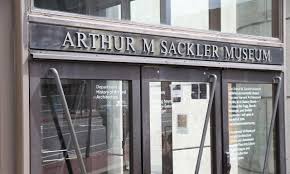The committee dismissed the student renaming proposal despite the role of Sackler-owned Purdue Pharma in the US Opioid epidemic.
Harvard University has decided not to take the name of the Sackler family from two of its buildings despite many years of protest from anti-opioid groups and families of people who overdosed on opioids.
Havard College Overdose Prevention and Education Students submitted a 23-page proposal to rename the Arthur M. Sackler Museum, part of the Harvard Art Museums, and the Arthur M. Sackler Building, a campus building, in October 2022. A Harvard review committee rejected the proposal in its most recent renaming proposal update.
The initial proposal evaluated by the Harvard Crimson stated that the name Sackler is “deeply tied to the opioid epidemic.”
It said, “For numerous individuals students, staff, and faculty, it is unacceptable and deeply offensive that the Sackler name is used to represent us. It is embarrassing and disconcerting to know that our school, unlike almost every other educational and cultural institution that at one point displayed the Sackler name, has decided to retain the name, despite the disrespectful mressage that it sends to our community and to the world.”
The Sackler family owned and controlled Purdue Pharma, which used to manufacture OxyContin. Over the last 20 years, over 500,000 people have died from overdoses in the US due to the deadly opioid pandemic, which is mostly to blame for the prescription painkiller problem.
The Harvard Review Committee, explaining its decision to keep the Sackler name, stated, “Informed by research and review of relevant literature, the committee found that while Arthur M Sackler’s legacy is complex and debatable, the petition did not meet the standard for dreaming under Harvard’s procedures for handling renaming requests.”
Arthur Sackler passed away nine years ago before the drug was introduced, yet his name has become closely associated with Purdue Pharma and the fatal opioid crisis.
However, the committee stated that it was “not persuaded by the proposal’s arguments that dreaming is appropriate because Arthur Sackler’s name is tainted by association with other members of the Sackler family, or because Arthur Sackler shares responsibility for the opioid crisis due to his having developed aggressive pharmaceutical marketing techniques that others misused after his death.”
This week, the Harvard Crimson reported that the Harvard Corporation, the university’s top governing body, approved the committee’s suggestion.
According to a press release, in response to the university decision, the anti-opioid group Prescription Addiction Invention Now (Pain) stated that “Harvard’s continued embrace of the Sackler name is an insult to overdose victims and their families.”
It also stated, “It’s time that Harvard stand by its students and live up to its mandate of being a repository of higher learning in history and an institution that embodies the best of human values.”
Meanwhile, according to Mika Simoncelli, a Harvard graduate who organized the student protest last year, “Even after receiving a strong, thorough proposal for renaming and facing multiple protests from students and community members about Sackler’s name, Harvard lacks the moral clarity to make a change that should have been made years ago.”
Harvard’s decision contrasts with those of several institutions worldwide, such as Tate Britain in London, the Metropolitan Museum of Arts and the Guggenheim in New York, the Louvre in Paris, and Tufts University in Massachusetts, all of which have eliminated the programs or signage bearing the name Sackler.















